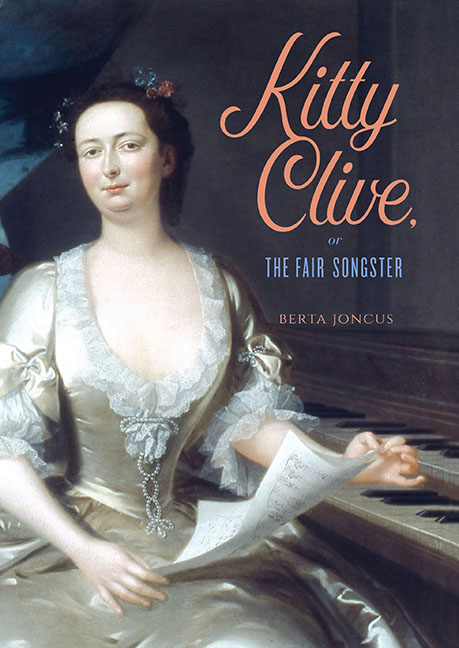Book contents
- Frontmatter
- Dedication
- Contents
- Illustrations
- Preface
- Conventions of Transcription
- 1 The Siren Song: Kitty Clive in the Playhouse
- 2 ‘The Lovely Virgin tun'd her Voice’: Henry Carey and the Production of a Native Songster
- 3 ‘Charm'd with the sprightly Innocence of Nell’: The Metamorphosis of Miss Raftor
- 4 ‘HINT writes, and RAFTOR acts in Drury-lane’: Clive, Fielding, and Theophilus Cibber
- 5 ‘The pious Daughter, and the faithful Wife’: Fielding, Miller, and Clive, 1733–35
- 6 ‘A Likeness where none was to be found’: Contested Images of Clive, 1734–37
- 7 The Patriot Soprano: British Worthies at Drury Lane
- 8 Handel and the Sweet Bird of Drury Lane, 1740–43
- 9 The Case of Mrs. Clive
- 10 Of Scuffles and Rivalries: The Demise of ‘Kitty Cuckoe’
- 11 From Miss Lucy to Mrs. Riot: Voice and Caricature
- 12 Clive on Clive: The Rehearsal: Or, Bays in Petticoats
- 13 Conclusion: The Fair Songster
- Appendix 1 Catherine Clive's Roles 1728–69
- Appendix 2 Lines in Catherine Clive's Repertory 1728–69
- Appendix 3 The Case of Mrs. CLIVE (1744)
- Select Bibliography
- Index
8 - Handel and the Sweet Bird of Drury Lane, 1740–43
Published online by Cambridge University Press: 20 September 2019
- Frontmatter
- Dedication
- Contents
- Illustrations
- Preface
- Conventions of Transcription
- 1 The Siren Song: Kitty Clive in the Playhouse
- 2 ‘The Lovely Virgin tun'd her Voice’: Henry Carey and the Production of a Native Songster
- 3 ‘Charm'd with the sprightly Innocence of Nell’: The Metamorphosis of Miss Raftor
- 4 ‘HINT writes, and RAFTOR acts in Drury-lane’: Clive, Fielding, and Theophilus Cibber
- 5 ‘The pious Daughter, and the faithful Wife’: Fielding, Miller, and Clive, 1733–35
- 6 ‘A Likeness where none was to be found’: Contested Images of Clive, 1734–37
- 7 The Patriot Soprano: British Worthies at Drury Lane
- 8 Handel and the Sweet Bird of Drury Lane, 1740–43
- 9 The Case of Mrs. Clive
- 10 Of Scuffles and Rivalries: The Demise of ‘Kitty Cuckoe’
- 11 From Miss Lucy to Mrs. Riot: Voice and Caricature
- 12 Clive on Clive: The Rehearsal: Or, Bays in Petticoats
- 13 Conclusion: The Fair Songster
- Appendix 1 Catherine Clive's Roles 1728–69
- Appendix 2 Lines in Catherine Clive's Repertory 1728–69
- Appendix 3 The Case of Mrs. CLIVE (1744)
- Select Bibliography
- Index
Summary
Clive, Milton, and Drury Lane's application masques – Beard's ascendance at Drury Lane – Handel meets Clive – hearing the vocalists in L'Allegro – the Sweet Bird captured in portrait – Rosamond in the labyrinth and Alfred in the Garden – Beard, Clive, and the making of Samson – oratorio triumphs – Handel, De Fesch, and Clive's voice
Comus had opened a new chapter for Clive. The goddess of masque had formerly dwelt apart from the smart ballad-singing comedienne; in Euphrosyne, they combined. The backstreets patriotism for which Clive had been known – her sneers at Jews, beaux, and opera singers, all standard for playhouse entertainment – crystallized in Comus, whose songs and epilogue staged her resistance to authority. After Comus, Clive was a patriotic Opposition soprano in stage works both comic and serious. After Comus also, Clive gained gravitas in a new line of sung ‘application’ stage works. Traditionally, an application work was a tragedy or historical play whose action could be seen to parallel events in the political arena. Comus had been a new kind of application play in that, in addition to featuring celebrities and song, it joined a story about sexual morality to one about public grievances. Other such works led by Clive followed: Rosamond, Alfred, and Samson. In each, the ideal Patriot leader, Frederick, ghosted behind the stage hero; Clive necessarily took second place. The career advantage of these works for Clive lay in their elitism. Their wordbooks were from Addison and Milton, their appeal was to power-brokers who could decode messages, and their music was the most sophisticated Clive ever sang. She welcomed this elevation, taking up opportunities to promote both herself and her protégée Mary Edwards.
First Encounters
Few were more fired up by the success of Comus than James Harris. His veneration of Milton matched his love of Shakespeare, which as discussed had led his circle to involve itself with James Miller's Clive-led version of Much Ado about Nothing. It matched also his respect for Handel, who belonged to his inner circle. Harris was living in Salisbury when Comus opened on 4 March 1738, but about a fortnight later his friend the scholar–cleric John Upton wrote urging him to purchase Thomas Arne's Comus score, not least because Arne ‘woud be glad of some money’.
- Type
- Chapter
- Information
- Kitty Clive, or the Fair Songster , pp. 227 - 274Publisher: Boydell & BrewerPrint publication year: 2019



